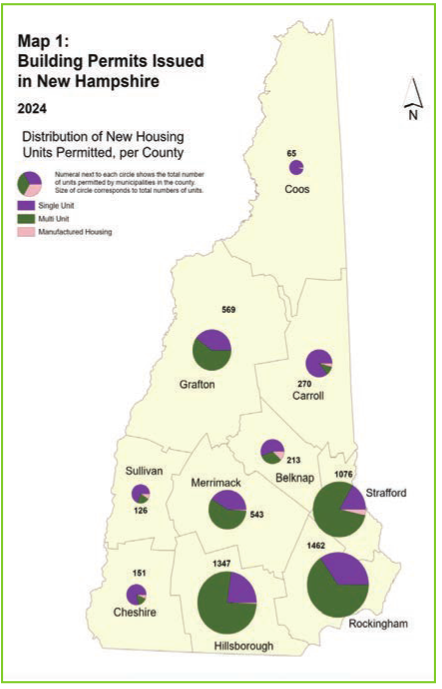
Attorney Chris Meier explains to the planning board Thursday a short-term rental ordinance he drafted on behalf of Sun Publisher Mark Guerringue (seated at right). Also seated at the table is Shawn Bergeron of Bergeron Technical Services who had questions about the article. (Photo by Daymond Steer)
The planning board will continue its discussion of a petitioned warrant article aimed at regulating short-term rentals at their next meeting Thursday, Feb. 1.
Sun Publisher Mark Guerringue filed the petition. If passed by voters in April, it will prohibit one-and two-family homes in residential neighborhoods, new and existing, from being rented out more than 30 calendar days per year without meeting state safety code standards.
The article defines a short-term rental as any property renting for more than 30 days per year that isn’t a long-term lease. For example, a property that rents for four single weeks or 15 weekends a year would not be considered a short-term rental and is allowed. Residents will vote on the article in April.
Guerringue and his attorney Chris Meier spoke to the article.
“The idea of this thing is to kind of balance property rights and preserve residential neighborhoods … (and) discourage investors who are using residential properties as hotels,” said Guerringue.
The planning board held a public hearing on the article. Normally, after the hearing the planning board votes up or down on recommending the article. However, in his case, the board decided they want to hear from legal counsel.
At the outset of the discussion, Town Planner Ryan O’Connor said the article would “significantly limit the number of properties which can be constructed for or converted to short-term rentals in specific settings, and would effectively concentrate new short-term rentals to commercial areas.”
O’Connor said one question is how existing STRs would be addressed if the article passed. “This is something that we need to have a conversation with counsel about,” said O’Connor adding staff also has concerns about code standards the article would impose. “There is some legal history that we can’t treat these types of units differently than you would a typical single family home or a duplex.”
Board chairman Ben Colbath said he asked town counsel Jason Dennis to look at the article and O’Connor was about to respond when planning board member Mark Hounsell called for a point of order. He said Dennis’ legal advice should be discussed in non-public session.
Hounsell then defended the article as something that’s needed to protect the town.
The law can be a sword or it can be a shield,” said Hounsell. “The people of Conway need this shield … The citizens of this town, the people who can’t find homes and people who want to raise families or people who want to send their kids to schools, they need protection, they need a shield. “
Hounsell continued, “Sure, you put up a shield, a sword may come. But if you’ve got a good enough shield, you can fight. And this is what we have to do. We have fight for our town. These short-term rentals have already ruined a good part of our town.”
Shawn Bergeron of Bergeron Technical Services voiced concerns about the article classifying STRs in “group R1” under the New Hampshire building code. He said grouping STRs under R1 would essentially be amending the state building code and the town doesn’t have authority to do that without the state’s permission, which is unlikely to be obtained.
“I see that as probably our greatest hurdle, just the jump to the R1 occupancy,” said Bergeron.
Planning board member Eliza Grant also questioned the R1 designation. She said R1 is for buildings with more than 10 occupants, hotels and motels.
Meier disagreed. He said the article would classify STRs according to the building code.
“Towns are allowed under both building and life safety codes to adopt more restrictive requirements,” he said, adding that for existing STRs a requirement to add firewalls might be required if there is a renovation or an addition. Fire alarms in each sleeping room would be required regardless.
Grant said the town already has a rental program that addresses fire alarms. She didn’t see how the town could enforce the provisions regarding the R1 group.
Resident Josh Brustin said Conway would be better off adopting Jackson’s STR ordinance and volunteered to help the town find an STR solution.
Meier said even if Conway copied Jackson, Conway would end up fighting in court.
Planning board member Bill Barbin asked Meier about a Housing Appeals Board case in which STR owners defeated the town of Freedom.
Meier said Freedom “ran into a problem” because it tried to take away grandfathering protections with zoning. Meier said that’s why he used the life safety provisions of the building codes instead.
“It’s certainly a pretty complicated issue,” said Meier. “I was asked to draft something that I thought would hold up in court. That’s it.”
On Friday, President of the MWV Renter’s Association Jerry DeCristofaro had this to say about the petitioned article: “The public hearing clearly shows the problem with attempting to re-classify single family homes as boarding houses for more than 10 guests, requiring firewalls and sprinklers. It just doesn’t pass the smell test. It literally violates RSA 48-A:2 by attempting to enact additional codes against STRs.”
Budgeteer Quentin Lewis was apprehensive about the court battle the article could start. “I would tread very carefully,” Lewis said.
This article is being shared by partners in The Granite State News Collaborative. For more information, visit collaborativenh.org.










